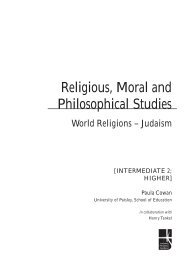Bertolt Brecht - Education Scotland
Bertolt Brecht - Education Scotland
Bertolt Brecht - Education Scotland
Create successful ePaper yourself
Turn your PDF publications into a flip-book with our unique Google optimized e-Paper software.
34<br />
CRITICAL STUDIES<br />
Berliner Ensemble after <strong>Brecht</strong>’s death in 1956, and the subsequent influence<br />
he and the company had on German-speaking theatre.<br />
Patterson, M, The Revolution in German Theatre 1900–1933, London:<br />
Routledge, 1981<br />
This is wide-ranging survey of the German theatre out of which <strong>Brecht</strong> sprang.<br />
The first part of the book deals with the social, political, philosophical,<br />
scientific and theatrical background of Expressionist theatre.<br />
The second part is much more important, particularly on the ‘Red Revues’ or<br />
political cabarets of <strong>Brecht</strong>’s youth. Also of great interest is the highly useful<br />
chapter that deals largely with <strong>Brecht</strong>’s production of Man equals Man,<br />
including sections on its set design, music, acting style and photographs from<br />
the 1931 production showing actors on stilts and the use of the famous halfcurtain.<br />
Patterson, M (ed. and trans.), Georg Büchner: Complete Plays, London:<br />
Methuen, 1987<br />
Büchner’s Woyzeck is credited with having led the way for the Expressionist<br />
and Realist experiments in theatre in the early twentieth century. <strong>Brecht</strong>’s<br />
Baal owes something to the play.<br />
Reinelt, Janelle, After <strong>Brecht</strong>: British Epic Theatre, Ann Arbor: University of<br />
Michigan Press, 1994<br />
Worth consulting, the subject matter is indicated in the title.<br />
Rius, Marx for Beginners, London: Writers and Readers Ltd, 1976<br />
Part of the problem for students of <strong>Brecht</strong> is the political aspect of his work.<br />
Marxism, and even Socialism, are becoming alien concepts today, so cheap,<br />
cheerful, easy-to-read introductions to this might be helpful.<br />
One of a series of cartoon beginners’ books, this one is actually fairly useful as<br />
a beginners’ guide (much more so than the one on <strong>Brecht</strong> in the same series,<br />
see page 36). Considering just how complex the topic is, it might be worth<br />
obtaining a class copy to pass around each student in turn.<br />
Schutzman, M, and Cohen-Cruz, J, Playing Boal: Theatre, therapy, activism,<br />
London: Routledge, 1994<br />
Though a dense and difficult book, it contains an extremely good essay that<br />
explores <strong>Brecht</strong>’s concept of the Gestus. Philip Auslander’s ‘Boal, Blau, <strong>Brecht</strong>:<br />
The Body’ (pp124–133) attempts to show how Boal, influenced by <strong>Brecht</strong>,<br />
explores oppression through theatrical means. Auslander uses an example<br />
from Caucasian Chalk Circle to help him do this, and also some of Boal’s<br />
other theatrical influences, such as Grotowski and Artaud. A revealing essay.<br />
DRAMA

















